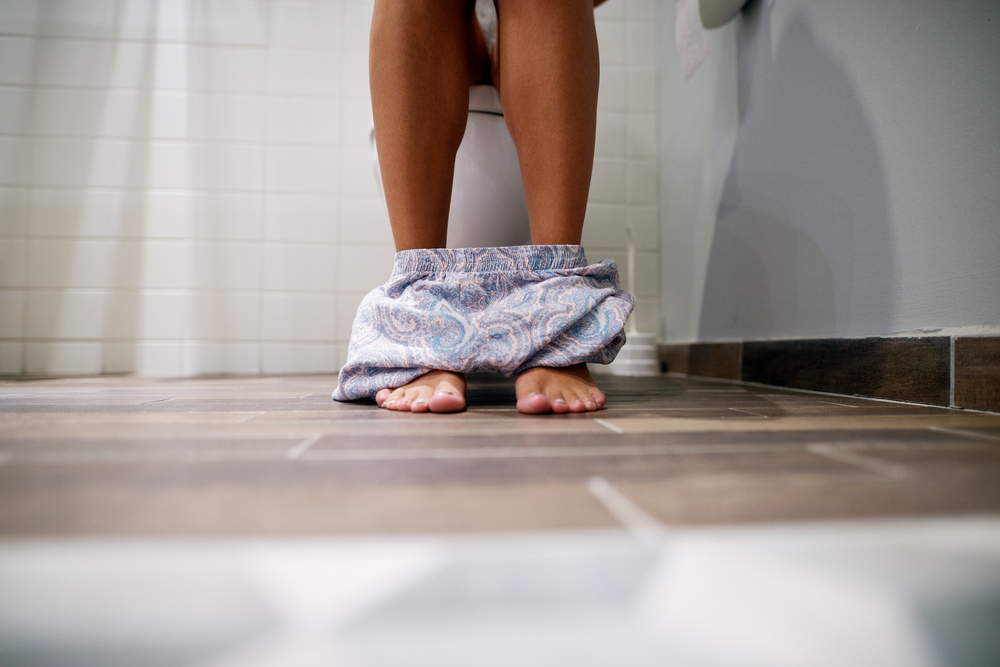Let's stay in touch
Keep in touch with us and stay up to date with latest in the world of healthcare and gut health!
Many women find that time of the month wreaks havoc on their gut. Whether you’ve been too embarrassed to ask or too afraid of the answer; we’re here to help you understand how periods affect your poop.
What is period poop?
Research has found up to 73% of women experience changes to their bowel movements during their period [1]. Period poop is the colloquial name for this phenomenon. It’s a broad category that mostly relates to poop, but also covers gut symptoms like bloating, cramps, constipation, diarrhoea and even nausea or vomiting.
Why do you poop more on your period?
You can thank prostaglandins for those frequent bathroom trips. These hormones stimulate the muscles in your uterus to help shed its lining each month. But, they can stimulate other muscles too, like the ones in your gut. Prostaglandin production increases in the first few days of your period to get things moving. That’s why most women experience cramps at the start of their period and may poop more often too.
Why does period poop smell different?
The most likely explanation is a change in your diet. The hormone progesterone rises just before your period and can make you crave foods high in fat and sugar. Your body has a hard time digesting these foods which means they move slower through your gut. A slow-moving gut can contribute to constipation, as well as strong smells since they took so long to pass through.
Wondering what to eat instead? Read our post on macronutrients and how they affect the gut.
Constipation and period poop
Speaking of constipation, it’s not just food to blame. High levels of progesterone and low levels of prostaglandins during PMS create the perfect storm to stop your bowels in their tracks. It’s extra important to eat plenty of fibre in the leadup to your period as it can help relieve symptoms of constipation.
Learn about the different types of fibre and how they support your gut.
Stress, anxiety and depression can make things worse
When you’re feeling low – whether from stress, anxiety or depression – your gut can feel it too. One study found that emotional distress increased the likelihood of gut issues for women during their period [1]. It should come as no surprise, since there are more neurons in your GI tract than in your brain or your spinal cord [4]. If you struggle with mood issues – whether on your period or not – it’s a good idea to speak with your health provider about treatment options.
Read more about how your gut works in our post Gut Health 101.
How to relieve period poop symptoms
Now that you know how your poop may change on your period; is there anything you can do about it? There sure is. Here are some actionable tips:
References:
[1] Gastrointestinal symptoms before and during menses in healthy women: https://bmcwomenshealth.biomedcentral.com/articles/10.1186/1472-6874-14-14
[2] Why is Period Poop the Worst? 10 Questions, Answered: https://www.healthline.com/health/period-poop
[3] How can your period affect bowel movements?: https://www.medicalnewstoday.com/articles/327009
[4] 5 Ways Your Period Messes with Your Pooping Habits: https://www.womenshealthmag.com/health/a19916310/5-ways-your-period-messes-with-your-pooping-habits/


SAMe is a compound best known for its antidepressant action. In this article, we seek to touch on the significant body of evidence that supports


Ingredients (4 serves):• 500g carrots, grated. (Ideally organic)• ½ red onion, finely sliced• Zest & juice of 1 lemon• 2 tsp toasted cumin seeds• 2cm




观看由创办人 Ian Brighthope教授为大家回顾了 Nutrition Care 的历史,並向大家保证将会继续坚持纯自然和更专业的理念,为世界人们提供高质量的保健品。


2018年4月26日,Nutrition Care在墨尔本举办庆典庆祝品牌创立40周年。 Nutrition Care是澳洲著名的保健品生产商,其创立于1978年,40年来一直致力于减少药品的使用。而此次40周年庆典的主题——自然更专业,也是他们长久以来希望传达给消费者的理念。26日下午1点半,Nutrition Care的40周年庆在墨尔本的Crown正式拉开序幕。 (著名主持人李维嘉,品牌创始人Ian Brighthope,澳洲名模Lauren Vickers) 此次庆典上,Nutrition


5月13日,Nutrition Care首次冠名全澳大学生华语辩论赛——NC纽新宝杯决赛于墨尔本市政厅成功举行! 本次辩论赛由澳洲著名保健品品牌NC纽新宝独家冠名,活动到场嘉宾有中国驻墨尔本总领事馆教育组杨智勇领事,本次评委阵容亦相当强大,其中就包括《奇葩说》著名辩手陈铭与胡渐彪 。 决赛双方分别是莫纳什大学中文辩论社和墨尔本大学中华辩论社,双方就【消费主义是当代灵魂的良药还是毒药】这一辩题,站在不同的角度,深度剖析。 最终,莫纳什大学代表队的表现获得了评委们的一致青睐,夺得本届全澳辩论赛中冠军。 比赛结束后,胡渐彪评委深入浅出解读【良药】【毒药】的定义,给辩手和台下观众们带来更深层次的思考。徐卓阳评委更是以赞助商NC纽新宝在台上的养胃粉为例,幽默而又直观地对话题进行了概括,通俗易懂,却又发人深思。Nutrition Care品牌创始人Ian Brighthope虽不能亲自到场,但特意录制了一段祝贺视频给参赛选手们。视频中Ian教授感谢选手们的付出,在母亲节这样特殊的日子里,他提醒远离家人的留学生们,要注意自己的身体健康,因为健康对他们而言,是在异乡追逐人生梦想最重要的急事之一。 最後,NC纽新宝为嘉宾、评委们以及每一位前来参加活动的观众准备了养胃小礼物,让大家在观 看辩论赛时感到暖心暖胃。
Keep in touch with us and stay up to date with latest in the world of healthcare and gut health!
| Cookie | Duration | Description |
|---|---|---|
| cookielawinfo-checkbox-analytics | 11 months | This cookie is set by GDPR Cookie Consent plugin. The cookie is used to store the user consent for the cookies in the category "Analytics". |
| cookielawinfo-checkbox-functional | 11 months | The cookie is set by GDPR cookie consent to record the user consent for the cookies in the category "Functional". |
| cookielawinfo-checkbox-necessary | 11 months | This cookie is set by GDPR Cookie Consent plugin. The cookies is used to store the user consent for the cookies in the category "Necessary". |
| cookielawinfo-checkbox-others | 11 months | This cookie is set by GDPR Cookie Consent plugin. The cookie is used to store the user consent for the cookies in the category "Other. |
| cookielawinfo-checkbox-performance | 11 months | This cookie is set by GDPR Cookie Consent plugin. The cookie is used to store the user consent for the cookies in the category "Performance". |
| viewed_cookie_policy | 11 months | The cookie is set by the GDPR Cookie Consent plugin and is used to store whether or not user has consented to the use of cookies. It does not store any personal data. |




Get free shipping on your first order* when you enter your details below.
*A minimum purchase of $25 is required. Always read the labeland follow the directions for use.